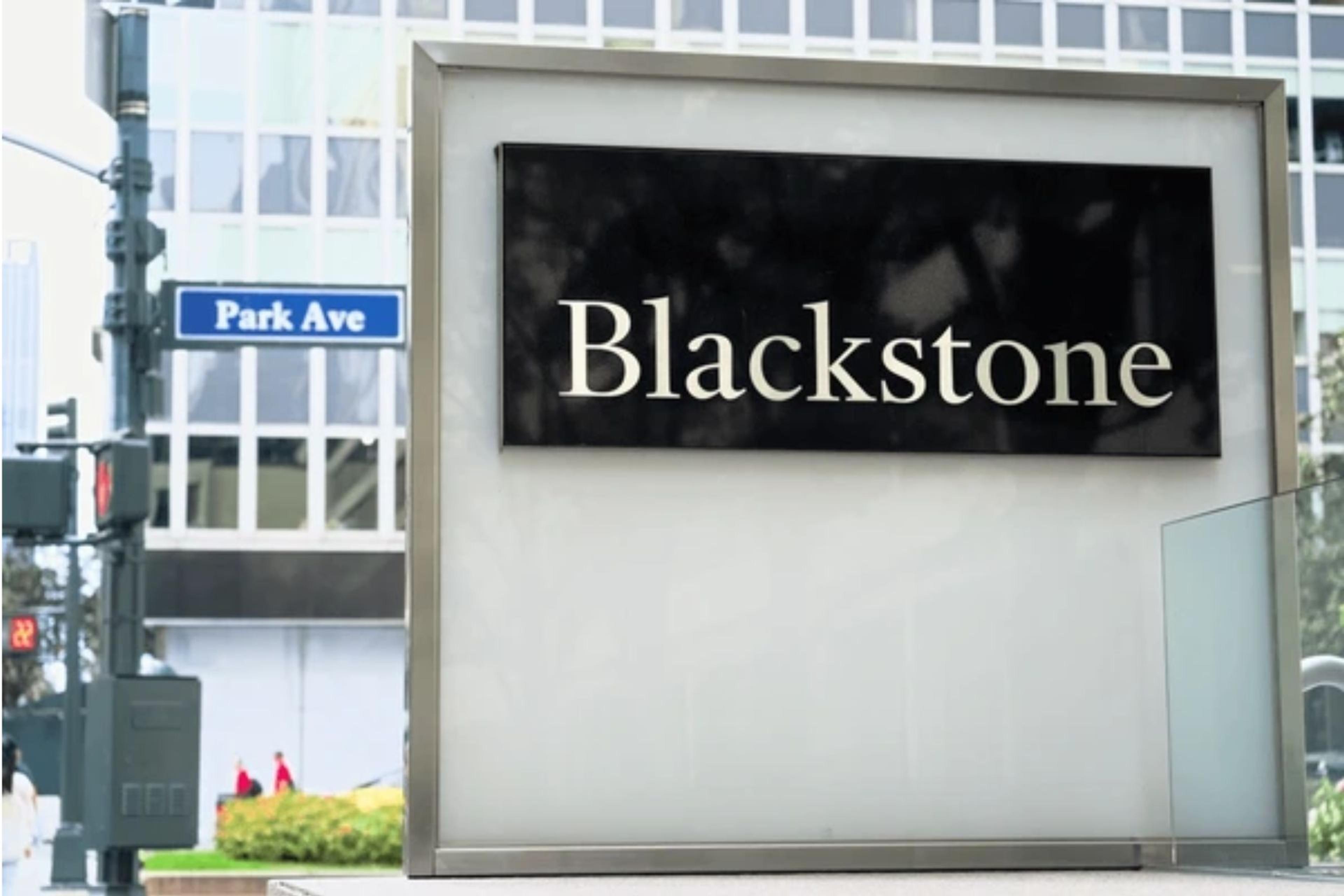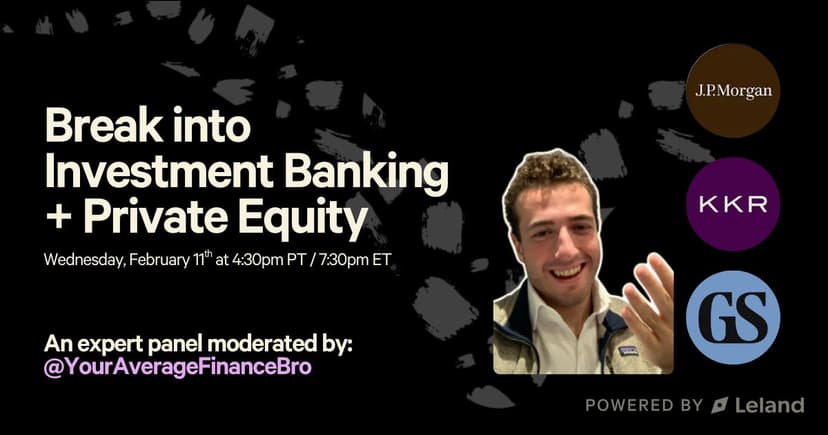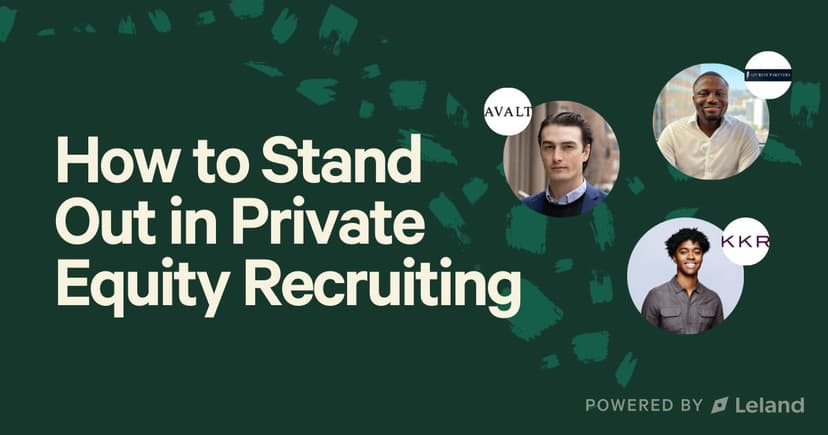How to Answer the "Why Blackstone?" Interview Question (Tips & Examples)
Learn how to answer "Why Blackstone?" with expert frameworks, real deal examples, and division-specific insights that set top candidates apart.
Posted August 12, 2025

Join a free event
Learn from top coaches and industry experts in live, interactive sessions you can join for free.
Table of Contents
When you walk into a Blackstone interview, there’s one question you can count on: “Why Blackstone? And why this division?”
This is a test of your insight, conviction, and cultural alignment. The best answers show a deep understanding of the firm’s DNA, tailored knowledge of the specific division, and a clear reason for choosing Blackstone over other top-tier private equity firms.
In this guide, we’ll break down how to craft a compelling, memorable answer—with examples, real insights, and a framework that applies across Blackstone’s four primary departments: Private Equity, Real Estate, Hedge Fund Solutions, and Credit.
Read: How to Ace Your Blackstone Interview
What Makes Blackstone Different?
With over $1 trillion in AUM, the Blackstone Group LP is the largest private equity firm in the world, but its true competitive edge lies in its ability to operate across multiple asset classes with unmatched scale and precision. This includes everything from commercial real estate and leveraged finance businesses to hedge fund solutions and private credit platforms, all underpinned by a long-term, institutional mindset.
What sets Blackstone apart is the firm’s integrated approach to sourcing, underwriting, and operating investments. Through its deeply interconnected platform, Blackstone generates proprietary deal flow, unlocks value through active ownership, and aligns with the interests of institutional investors, pension funds, and increasingly, retail investors. The firm’s ability to serve this diverse capital base across geographies and strategies has made it a uniquely resilient force in both bull and bear markets.
Even its recruiting process reflects this selectivity and system-level thinking. Blackstone was one of the first major investment firms to incorporate Pymetrics assessments, using neuroscience-based games and behavioral data to evaluate traits like risk tolerance, pattern recognition, and memory, mirroring the real cognitive demands of high-stakes investing.
Here are some quick links you may find helpful:
- About the Firm
- Blackstone Private Equity Homepage
- Blackstone Insights (News & Stories)
- Blackstone Portfolio Operations
- Blackstone Tactical Opportunities
Read: Blackstone Pymetrics: Interview Questions & Tips
Blackstone Interview Process: What to Expect & How to Win
The Blackstone interview process is one of the most rigorous in the alternative investments industry, and for good reason. With tens of thousands of applicants across its four primary departments (Private Equity, Real Estate, Credit, and Hedge Fund Solutions), Blackstone uses a layered and selective approach to screen for both technical horsepower and cultural alignment.
Blackstone Interview Process Overview
| Phase | What Happens | Who You’ll Meet |
|---|---|---|
| Resume + Pre-Screen | Blackstone screens for exceptional candidates from top-tier schools or firms. Strong candidates typically have elite banking, consulting, or investing experience, a demonstrated interest in alternatives, and a track record of execution. May include Pymetrics test, HireVue, or headhunter screen. | Recruiting team, automated systems, external search firms |
| Round 1: Technical Screen | Expect a fast-paced 30–45 min interview covering LBO math, accretion/dilution, 3-statement linkage, and investing logic. Often includes cold questions like “Walk me through a deal you followed.” For credit or real estate, be ready to discuss capital structure or cap rates. | Associates or junior VPs from the division you're applying to |
| Round 2: Fit + Behavioral | This round tests maturity, poise, and cultural alignment. Be ready to walk through your story, answer “Why Blackstone?”, and speak to leadership, grit, and self-awareness. Expect pushback, stress-testing, and questions like “Tell me about a time you failed.” | Mid-to-senior VPs, principals, or senior team members |
| Round 3: Case Study / Technical Deep Dive | You’ll complete a paper LBO, modeling exercise, or investment memo. Credit teams may give a debt underwriting scenario. Real estate candidates might assess a leaseback or REIT-style asset. May be verbal or written. Focus is on clarity, investor judgment, and communication. | Senior VP, MD, or partner (often 1-on-1 or panel setting) |
| Final Round: Partner Interviews | This is a mix of high-level fit, investing judgment, and division-specific strategy discussions. You’ll be evaluated on thought process, presence, and potential to contribute on day one. May include one “wild card” interviewer to test composure. | Division head, senior partners, or cross-functional leadership (often rapid-fire or back-to-back interviews) |
On-Cycle vs. Off-Cycle
- On-Cycle (undergrad/analyst PE recruiting): Compressed, can be 48–72 hours from headhunter call to offer.
- Off-Cycle (MBA or lateral hires): More deliberate, multiple weeks, often includes coffee chats and deal walk-throughs.
Pro Tip: Don’t just prep the standard LBO. Be ready for qualitative discussions on deal sourcing, thesis creation, and how the firm invests across multiple asset classes.
How to Answer “Why Blackstone?”
“Why Blackstone?” is one of the most important questions you'll face in the interview process, not because it's tricky, but because it reveals how well you understand the firm and how convincingly you can position yourself as a fit.
When interviewers ask this, they’re not looking for praise. They’re testing for intellectual depth, strategic thinking, and personal alignment. They want to know: Have you moved beyond surface-level research? Can you articulate how Blackstone is uniquely positioned in the market and why that matters to you?
Example interview response:
“I want to be at a firm that not only sets the pace in private markets but also operates with institutional discipline and scale. Blackstone’s role as a leading company in the alternative asset management business makes it the right place to learn how to invest across cycles, build real operating value, and collaborate across teams. Whether it’s executing leveraged buyouts, analyzing hedge funds, or expanding global real estate portfolios, Blackstone offers the range and rigor I’m looking for. I’m especially interested in the [Private Equity / Real Estate / Credit] division because it blends structured investing with sector expertise. I’m excited to contribute to teams that deploy long-term investment strategies in partnership with institutional investors and retail investors alike.”
What Interviewers Are Really Listening For
The strongest candidates approach this question like an investor would approach a deal: with rigor, specificity, and a clear thesis. That means being able to speak fluently about Blackstone’s business model, not just as a private equity firm, but as a global alternative asset manager with a $1T+ portfolio spanning real estate, credit, and hedge fund solutions. It means understanding how the firm invests across multiple asset classes for both institutional investors and retail investors, and what makes Blackstone’s approach to value creation different from peers.
Most importantly, it means you’ve reflected on how your own background, skill set, and ambitions align with that vision. That’s what turns a decent answer into a memorable one.
Read: Intro to Financial Modeling – With Examples
The 3-Part Framework of a Great Answer
World-class answers to “Why Blackstone?” tend to follow the same structure. You don’t need to use this formula verbatim, but each part should be reflected in your thinking.
- Conviction - Start by showing that this is a deliberate, informed choice. Why Blackstone specifically? What makes the Blackstone Group your top pick—not just over other private equity firms, but over other leading companies in the broader alternative asset management business? This is your chance to signal clarity of intent and deep professional self-awareness.
- Context - Next, demonstrate your understanding of the firm’s strategy—especially the division you’re interviewing with. For instance, if you're focused on credit, you should be able to talk about how Blackstone merged GSO’s operations to build one of the largest credit platforms globally, and how that transformed its ability to lead in existing debt investment operations, leveraged finance businesses, and direct lending. If you're targeting real estate, you might reference specific notable real estate investments and how Blackstone uses leaseback strategies and corporate partnerships to unlock value.
- Culture - Finally, explain why you're a match not just for the work, but for the way Blackstone operates. Think high performance, entrepreneurialism, humility, and collaboration. This is a firm that thrives on initiative and disciplined execution across investment strategies with an unusually flat structure where analysts are expected to contribute from day one. The more you can connect your personal values and experiences to that culture, the stronger your answer becomes.
A Quick Litmus Test
If your answer still sounds like it could be applied to any other PE firm, it’s not ready. You should be able to swap in references to actual Blackstone transactions, divisions, or differentiators. Things like its role in the Southern Cross-led healthcare investment, or how the Blackstone Group LP bought Northern California office buildings as part of its real estate platform. That level of detail is what interviewers at Blackstone expect.
Example of a strong answer:
“Blackstone’s scale gives it access to deals that reshape industries. But what stands out to me is how the firm builds, not just buys. Whether it’s the platform approach in private equity or transforming real assets into real estate, Blackstone operates with a long-term, thesis-driven mindset. That aligns with how I’ve approached investing in my internships. I’m particularly drawn to how the firm works with institutional investors to deploy capital across cycles.”
Book a 1:1 Blackstone interview prep session with a top private equity coach to craft a custom answer that reflects your background and the division you’re targeting.
Blackstone Case Study: What It Is and How to Prepare
The Blackstone case study isn’t just a skills test—it’s a window into how you think. It’s how the firm evaluates whether you can operate like a first-year associate: balancing rigor, judgment, speed, and commercial instinct under pressure. Technical fluency gets you in the door. Structured thinking, investment insight, and strategic communication get you the offer.
Whether you're interviewing for Private Equity, Real Estate, Credit, or Hedge Fund Solutions, the case is designed to assess one thing: can you think like Blackstone?
What to Expect Across Divisions
Private Equity & Growth Equity
Expect a paper LBO, based on a short CIM or teaser. You’ll build a stripped-down model and write a memo or pitch recommending whether to pursue the deal. The real test is not your Excel wizardry, but it’s your ability to prioritize drivers of value, articulate a clear thesis, and speak to risk like an investor.
Pro tip: Your model can be basic, but your memo should be sharp, confident, and strategic. Frame it like you’re presenting to a partner who has 10 minutes.
Real Estate & Credit
Here, the case is often verbal, drawn from a live or historical deal. You may be asked to evaluate a commercial real estate asset, a structured debt instrument, or a distressed situation. You’ll be expected to discuss key financial metrics, identify operational risks, and outline how Blackstone would underwrite and de-risk the asset
Expect questions like “This is a leaseback of healthcare facilities. How would you mitigate the operator risk? What precedent deals has Blackstone done in this space?”
If you can tie it back to Blackstone’s leaseback strategy on Southern Cross or its purchase agreement structure on Apria Healthcare, you’ll signal real prep and real understanding.
Sourcing Roles or Summer Analyst Interviews
Some groups will test origination ability via a cold-calling case. You might be asked to propose a market angle, identify target companies, and defend your sourcing thesis. This is especially common in growth equity, private credit, and real estate roles.
They’re looking for commercial creativity, industry insight, and whether you’ve internalized how the firm focuses on scalable platforms and controlling interest where possible.
What Makes Blackstone’s Case Study Different
Unlike other firms that focus purely on the model, Blackstone’s case study is layered. It blends strategic thinking, market pattern recognition, risk awareness, and communication clarity.
You’ll be expected to connect your answer to how the firm invests across multiple asset classes, and how that aligns with broader investment strategies across its businesses. A top answer might reference Blackstone’s historical approach to notable investments—like the Australian casino operator, or its turnaround of Sea World Parks after the purchase agreement was finalized.
How to Prepare Like a Top Candidate
Crushing the Blackstone case study isn't just about being technically sound—it's about proving you think like the firm. Top candidates approach prep like analysts preparing for an actual investment committee meeting. That means developing commercial judgment, strategic clarity, and the ability to make defensible recommendations under pressure.
Know the firm’s investment playbook
The best candidates go deeper than the headline. In the Southern Cross case, most mention the leaseback model. Fewer understand how operator instability was the root cause of failure. In Sea World, the lesson wasn’t just about turnaround; it was about public perception, control, and exit timing. Blackstone’s acquisition of an Australian casino operator was more than an opportunistic play; it was a strategic move into regulated assets with long-term cash flows and global scale.
Every one of these transactions reflects how Blackstone underwrites risk, creates value, and allocates capital across multiple asset classes. Show the interviewer that you’ve internalized that logic.
Write like an investor, not a candidate
Your memo or your verbal pitch should be structured, thesis-driven, and confident. Think about what a senior MD actually wants to know: What’s the opportunity? Why now? What’s the upside, and what could kill the deal? Can this scale? Would this pass an investment committee vote?
A standout candidate doesn’t just explain what the numbers say—they interpret them. They lay out a clear narrative, anticipate pushback, and tie the investment back to Blackstone’s core investment strategies, whether it’s platform roll-ups, operational turnarounds, or high-conviction thematic bets.
Model with discipline, not flash
At this level, Excel is table stakes. What matters is clarity of assumptions, defensible drivers, and tight logic. Strong models demonstrate real understanding of how return is generated: through EBITDA growth, debt structuring, and value creation levers, not just IRR gymnastics. You should be able to flex capital structure scenarios, show how institutional investors or financial institutions might view the risk profile, and explain your case in plain language.
Tie everything back to how Blackstone operates
This is where great candidates separate themselves. Every case, no matter how technical, should be grounded in Blackstone’s actual philosophy. How does this opportunity reflect the firm’s style of investing? Where have they done something similar? Would this appeal to pension funds, retail investors, or internal assets the firm is managing? Could it expand into adjacent sectors, become part of a platform, or offer a controlling interest?
If you’re not connecting your analysis to how the firm invests, you’re solving in a vacuum. The best candidates simulate the real-world decision-making process a Blackstone deal team would go through.
If you would like to prepare with someone who has experience coaching people through private equity interviews and financial models, here are some packages we recommend:
- Ace Your Private Equity Interview: Case Prep, Financial Modeling - with Ed Z., Managing Partner at Search Fund, Former PE Vice President at HIG Capital and Associate at Gauge Capital, Wharton MBA
- Crack the PE Case Study Intensive 3-Day Prep - with Asha T., HBS MBA, Senior Associate at Apax, Former Associate at JP Morgan
- How to Nail Your PE Interviews - with Ashley B., Stanford GSB MBA, Former VP at Altamont Capital Partners, Investor
Division-Specific Strategy: How to Tailor Your Answer
1. Private Equity Division
Private equity at Blackstone is more than control deals—it’s platform-building. The private equity business operates across global buyouts, growth equity, and sector-focused strategies.
Include this in your answer:
“What sets Blackstone’s private equity group apart is its long-term approach. From minority investments to leveraged buyouts, the firm invests across a wide range of structures. The scale of committed capital and depth of the operating partner bench make it a compelling place to learn how to create value beyond financial engineering.”
Blackstone’s private equity fund has included deals like:
- Blackstone acquired Prime Hospitality, executing a leaseback strategy to unlock asset value.
- Blackstone claimed operational improvements were key in its subsequent IPO of Busch Garden Parks and Sea World Parks.
- The firm previously managed investments like Apria Healthcare and Southern Cross, offering cautionary lessons on unsustainable business models in the nursing home business and elderly care market.
To stand out, show you're aware of both the upside and complexity.
2. Real Estate Division
Real estate is Blackstone’s crown jewel. Over $300B in AUM and a string of notable real estate investments that changed skylines.
What to emphasize: “Blackstone’s real estate strategy, especially its ability to execute across both core and opportunistic risk-return profiles, offers unparalleled exposure to platform building and scale execution.”
Examples to weave into your answer:
- The Blackstone Group LP bought Northern California office buildings as part of a corporate partnership with tech companies.
- It acquired AlliedBarton Security Services, integrating real estate security operations with facility strategy.
- One purchase involved splitting assets across REIT structures for tax efficiency.
This kind of market-making requires a deep understanding of property dynamics, capital structure, and macro cycles, perfect for someone looking to blend finance with operational strategy.
3. Hedge Fund Solutions (BAAM)
Blackstone’s hedge fund solutions platform is one of the largest globally. Rather than simply allocating, it builds proprietary hedge funds and drives strategic partnerships with financial institutions.
This arm emphasizes:
- Risk-adjusted alpha generation
- Marketable alternative asset management
- Collaboration with large institutions and pension funds
Use this kind of framing: “I’m interested in Blackstone’s Hedge Fund Solutions because it doesn’t just allocate—it builds. BAAM gives analysts exposure to risk modeling, fund structuring, and alpha-sourcing decisions across multiple asset classes.”
4. Credit (Private Credit + GSO Legacy)
Blackstone’s credit business—bolstered when Blackstone merged GSO’s operations—is now one of the largest credit platforms globally.
A strong interview response here might look like:
“Blackstone’s Private Credit group offers unique exposure to both public and private instruments, including existing debt investment operations, leveraged finance businesses, and structured credit. I’m particularly interested in how the combined entity created broader access to direct lending and special situations strategies.”
Noteworthy credit deals:
- Blackstone acquired an energy company with distressed debt, leading the turnaround through active board involvement.
- The combined entity has managed internal assets more efficiently since the GSO integration.
Optional (But Powerful) Additions to Mention
These show advanced prep:
- Blackstone created a combined entity from GSO to dominate private credit.
- Blackstone acquired DLJ, a lesser-known but strategic move that expanded investment banking capabilities.
- The firm’s notable investments include Southern Cross, Sea World, and an Australian casino operator, each showing a different investment thesis.
- The business evolved after the financial crisis, when Blackstone withdrew from certain sectors and adapted its purchase agreements to mitigate macro risks.
Final Thoughts: Become a Candidate Who Stands Out at Blackstone
Landing an offer at Blackstone isn’t just about checking technical boxes—it’s about showing up with clarity, curiosity, and commercial judgment. You need to demonstrate that you understand the firm at a strategic level, can think like an investor, and are someone they’d want on the team in a high-stakes meeting.
What sets top candidates apart isn’t just polish—it’s preparation with purpose. They’ve studied the firm’s deals, practiced telling investment stories that matter, and refined their answers until they sound not rehearsed, but real.
If you’re serious about breaking into Blackstone, don’t prep alone. Get paired with a top private equity coach who’s worked at or been hired for Blackstone and knows exactly how to help you stand out. Whether you need help with your “Why Blackstone?” answer, investment pitch, or case study prep, Leland has world-class coaches ready to help. Find your Blackstone coach here. Also, check out private equity bootcamps and free events to unlock your full PE potential.
See: The 10 Best Private Equity Career Coaches for Interview Prep & Training
Read these next:
- The Best Finance Newsletters & Podcasts to Subscribe To
- Private Equity Resume Guide (With Template & Example)
- Best Questions to Ask at the End of an Interview
- The Different Types of Buy-Side Firms–and How to Choose One
- 50+ Most Common PE Interview Questions & Answers (Behavioral/Technical)
- The 10 Best Questions to Ask Your Interviewer in a Private Equity Interview
- Top Private Equity Internship Programs (and How to Stand Out)
- Finance Internships for College & High School Students
FAQs
What’s the best way to answer “Why Blackstone?” in an interview?
- To stand out, your answer needs to go beyond prestige. Show you understand Blackstone’s strategy, the specific division you’re targeting, and why it fits you.
How do I prep for the Blackstone case study if I don’t have a finance background?
- Start by learning how Blackstone actually invests, then practice structuring simple investment memos and walking through your logic clearly under pressure.
What makes Blackstone different from other private equity firms?
- Blackstone isn’t just a PE firm but a full-scale alternative asset manager with strategies across private equity, real estate, credit, and hedge funds.
How technical is the Blackstone interview process?
- Expect a mix of technical questions, case studies, and behavioral fit checks. They're testing not just what you know, but how you think and communicate.
Can I talk about Blackstone deals in my interview?
- Yes, referencing real Blackstone deals is a great way to show you’ve done your homework. Just make sure you understand the thesis behind them, not just the outcome.






















